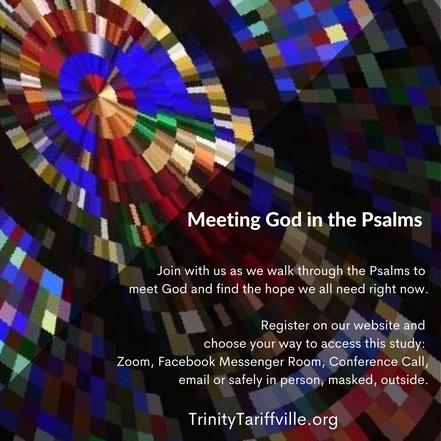
Meeting God in the Psalms
Study with small group discussion
Details:
Sign up to participate at the button at the bottom of the page.
The basic class is an hour and 15 minutes.
There are four parts :
When where, and who:
The live, distanced in-person class will be on Wednesday evenings. That class is probably full, but you can inquire.
Father Taylor will also lead a Thursday evening group on Zoom, at 6:30.
Small group leaders will have their own times, so there should be a variety to choose from.
Why Psalms?
Our starting point is something within us.
Under the motion of the busyness of our lives, there is a longing, a need. We are fortunate to have more of almost everything than anyone else in the world, perhaps history. Yet there is something missing at a spiritual level, and that longing is for God.
We can learn the elements and rhythm of a church service, we can enjoy the friendships of fellowship, we can begin to understand the grace of God in Christ, but to go deeper, to discover a relationship with God where we are known and where we begin to know God is not automatic.
The Scriptures themselves are God given. In the opening Gospel of John, Jesus is called the Word. God chooses to reveals himself in words. These words, along with the way the Spirit of God uses them, open our minds and hearts to understand. There are parts of the Bible which give insight into Creation, parts that reveal God at work in the history of Israel, and the Gospels that reveal Jesus as God’s answer, the Son of God. There are parts that explain and teach what God was doing in the life, death, and resurrection of Jesus. All of the Scriptures are a gift. But there is one section that is unique both in the way it is written, and in what it reveals about the relationship, the interaction between the infinite and Holy God and us mortal, everyday people. And what this section reveals is not only profoundly amazing, but instructive in how we can pursue God, know God, and discover this missing piece that is, as the Scriptures say, the source of light and life.
To read the Psalms is like looking over the shoulder of a mentor to see how they pray. What we quickly discover is that the Psalms are not their words alone, but God responding as they pray. We see how their prayers have a center, the covenant God has established with God’s people. These prayers show a wide range of emotion, from the praise we might have expected, to challenges, anger, desperation, fear, joy, even a peace that God gives within dangerous and troubling circumstances.
The Psalms are written as poetry and meant to be sung. They don't rhyme, and they aren't delicate or frail. The Psalms are the kind of necessary poetry that takes over when the words and sentences of everyday use cannot take us to the heights and depths of God, or even the heights and depths of our own experience. They encourage us, they lead us into places of understanding God where words ultimately fail, where knowing God and being known by God simply is, like a gaze between two people who know each other and love each other without fear.
In church, we hear prayers, and we know prayer is important. But, truth be told, we can struggle to pray. There are requests and cries for help. But prayer that leads us deeper into God is not always easy. The Psalms have been used as a way to pray since the time they were written, some close to three thousand years ago. Think if that- to pick up a Psalm that has been held and prayed by someone in a situation like ours, long before Jesus. And, Jesus himself seems to a have memorized many Psalms, including Psalm 22 which he prayed from the cross. We really do join the great cloud of witnesses who have gone before in praying these prayers together.
Our goal is to connect us to the Psalms so that they become a guide, mentors to our own prayer. My experience is that the Psalms become the like songs we hear and like and learn how to sing ourselves. And soon, we're not just singing along, but we are the singer and the words are our own. And, before long, we sing them to the object of our heart, and the Lord responds.
My goal is to start our adventure with the Psalms shortly after Labor Day week. I am seeking leaders so that we can have groups where everyone can participate easily online.
~Father Taylor
Why Wait?
Get your Prayer Book, turn in the back to the Psalms, and try following the Psalms in 30 day pattern. You will see the italicized, First Day: Morning Prayer and each day or evening through Day 30 above the Psalm. Write down what you notice. Ask the Lord to guide you!
This series will be presented so that it can be safely accessed, with teaching and small group discussions. The program is developed using the book Praying the Psalms, by Walter Brueggemann, which is optional for participation. We will use the psalter in the Book of Common Prayer.
Sign up to participate at the button at the bottom of the page.
The basic class is an hour and 15 minutes.
There are four parts :
- A 12 minute video (or live if you are in Father Taylor's in-person session)
- Interactive questions to help learn what to look for in a Psalm,
- A time of praying the Psalm chosen for the evening, sometimes together, sometimes individually based on what we have learned.
- Brief questions and answers and next steps.
When where, and who:
The live, distanced in-person class will be on Wednesday evenings. That class is probably full, but you can inquire.
Father Taylor will also lead a Thursday evening group on Zoom, at 6:30.
Small group leaders will have their own times, so there should be a variety to choose from.
Why Psalms?
Our starting point is something within us.
Under the motion of the busyness of our lives, there is a longing, a need. We are fortunate to have more of almost everything than anyone else in the world, perhaps history. Yet there is something missing at a spiritual level, and that longing is for God.
We can learn the elements and rhythm of a church service, we can enjoy the friendships of fellowship, we can begin to understand the grace of God in Christ, but to go deeper, to discover a relationship with God where we are known and where we begin to know God is not automatic.
The Scriptures themselves are God given. In the opening Gospel of John, Jesus is called the Word. God chooses to reveals himself in words. These words, along with the way the Spirit of God uses them, open our minds and hearts to understand. There are parts of the Bible which give insight into Creation, parts that reveal God at work in the history of Israel, and the Gospels that reveal Jesus as God’s answer, the Son of God. There are parts that explain and teach what God was doing in the life, death, and resurrection of Jesus. All of the Scriptures are a gift. But there is one section that is unique both in the way it is written, and in what it reveals about the relationship, the interaction between the infinite and Holy God and us mortal, everyday people. And what this section reveals is not only profoundly amazing, but instructive in how we can pursue God, know God, and discover this missing piece that is, as the Scriptures say, the source of light and life.
To read the Psalms is like looking over the shoulder of a mentor to see how they pray. What we quickly discover is that the Psalms are not their words alone, but God responding as they pray. We see how their prayers have a center, the covenant God has established with God’s people. These prayers show a wide range of emotion, from the praise we might have expected, to challenges, anger, desperation, fear, joy, even a peace that God gives within dangerous and troubling circumstances.
The Psalms are written as poetry and meant to be sung. They don't rhyme, and they aren't delicate or frail. The Psalms are the kind of necessary poetry that takes over when the words and sentences of everyday use cannot take us to the heights and depths of God, or even the heights and depths of our own experience. They encourage us, they lead us into places of understanding God where words ultimately fail, where knowing God and being known by God simply is, like a gaze between two people who know each other and love each other without fear.
In church, we hear prayers, and we know prayer is important. But, truth be told, we can struggle to pray. There are requests and cries for help. But prayer that leads us deeper into God is not always easy. The Psalms have been used as a way to pray since the time they were written, some close to three thousand years ago. Think if that- to pick up a Psalm that has been held and prayed by someone in a situation like ours, long before Jesus. And, Jesus himself seems to a have memorized many Psalms, including Psalm 22 which he prayed from the cross. We really do join the great cloud of witnesses who have gone before in praying these prayers together.
Our goal is to connect us to the Psalms so that they become a guide, mentors to our own prayer. My experience is that the Psalms become the like songs we hear and like and learn how to sing ourselves. And soon, we're not just singing along, but we are the singer and the words are our own. And, before long, we sing them to the object of our heart, and the Lord responds.
My goal is to start our adventure with the Psalms shortly after Labor Day week. I am seeking leaders so that we can have groups where everyone can participate easily online.
~Father Taylor
Why Wait?
Get your Prayer Book, turn in the back to the Psalms, and try following the Psalms in 30 day pattern. You will see the italicized, First Day: Morning Prayer and each day or evening through Day 30 above the Psalm. Write down what you notice. Ask the Lord to guide you!
This series will be presented so that it can be safely accessed, with teaching and small group discussions. The program is developed using the book Praying the Psalms, by Walter Brueggemann, which is optional for participation. We will use the psalter in the Book of Common Prayer.
